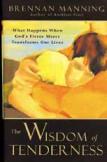A Gospel for Living
Brennan Manning describes himself as a vagabond evangelist. Author of 11 books, he leads spiritual retreats in the United States and Europe. His life story reads like a catalog of been there, done that. A former Franciscan, a former Roman Catholic priest, a formerly married man, a recovering alcoholic, he sees himself as a man of imperfections. But he is glad to be a friend to notorious sinners and dedicates his books, by name, to some flawed persons whom God loves.
In The Wisdom of Tenderness he acknowledges the seminal thinking of Kevin O’Shea and Walter Burghardt. On the same page he thanks Ed Moïse, the master chef at the 8271/2 Toulouse Restaurant in New Orleans, the computer guru whose genius turned the remote possibility of meeting the deadline into reality. In the foreword to A Glimpse of Jesus, Manning affirms the church as the locus of my encounter with Jesus Christ. And it is safe to say (based on observation by others) that he means not only the Christian Church broadly understood, but also the Roman Catholic Church, for the new Manning is a frequent Mass-goer and communicant.
Both of these books deal with a central theme of Manning’s: the problem of self-hatred and the way Jesus overcomes that with his unrelenting love. But don’t look for gentle Brennan in his pages. Manning writes with a lot of edginess. He spends much of his authorial time lashing out at what he calls contemporary distortions of the image of God: [the] caricatures of God that litter today’s Christian landscape, whether the enraged deity who sanctions the slaughter of innocent cops and firefighters (9/11/01) because he finds abortion and homosexuality intolerable or the benign, permissive patriarch who winks at adultery, countenances bigotry, and remains unruffled when thousands of hoodwinked Christians finally flee the church to preserve their faith and their sanity. These ills, he says, are the handiwork of successful salespeople posing as spiritual leaders.
What can I say? His rhetoric has a brood of vipers quality.
But while condemning the worst ills of the current spiritual landscape, Manning takes as a point of departure a text from Matthew: When Jesus saw the crowds, he felt sorry for them (Mt 9:36). For me, this is the first clue to what Manning really wants to tell the reader. Jesus knows hearts, including my own, much better than I do. If I am holding myself and others to an impossible standard, if I am holding myself to account not only for my real sins but for the imagined unforgivability of them, I have need of the tenderness of Jesus.
The tenderness of Jesus frees us from embarrassment about ourselves, Manning writes. He lets us know that we can risk being known, that our emotions, sexuality, and fantasies are purified and made whole by his healing touch, and that we don’t have to fear our fears about ourselves. Manning wishes we could understand the full force of the word tenderness, consistently employed in The Jerusalem Bible translation. Its antecedent is the French la tendresse, for The Jerusalem Bible translation was first made from the original texts into French, then into English. TendernessLatinists already had some inkling of thisis a stretching out, the beginnings of an embrace. The related French verb étendre conveys this sense of welcome. When Jesus says, Are you tired? Worn out? Burned out on religion? Come to me, get away with me and you’ll recover your life’ (Mt 11:28) the poignant image of his outstretched arms conveys longing, intense desire, and a profound understanding of the human condition. Jesus knows that we will experience fatigue along the Way and get bollixed, beat up, and burned out by church, relationships, parenting, ministry, career, appetites, addictions, and our recurring neuroses.
The same themes that are treated in The Wisdom of Tendernessthe evils of self-hatred, the tyranny of the false self, the many distortions of contemporary culture and pop spirituality, the need to surrender to God’s heart of loveall these are refined, honed and polished in A Glimpse of Jesus. Both books show a breadth of reading and a wish to share that bibliography with the reader: Everything from Walter Burghardt to William Shakespeare to Iris Murdoch to Meister Eckhart is grist for the spiritual mill. Both are written in alternating bouts of storytelling and reflection, calling up vivid pictures of a personal Jesus, his forgiving Abba and the wounded people who need them the most: the elderly woman religious who came at the end of her life to be freed of the memory of sexual abuse by her own father; the numerous addicts who have turned their lives over to Jesus Christ.
So, as I slosh nimbly through the puddles of advancing age, it would be untimely and absolutely inappropriate for me to write mincing pastorals, sensitive soul-blubber, and well-behaved meditations for pious people. Manning takes another path. His focus is on the journey to God. You see, the older I get, the more I ask myself, How is my life unfolding in terms of my primary goal of living with God forever?’
If you care about Jesus as a healer, if you need his healing hand in your own life and if you are willing to be roughed up a little by the street wisdom gained from real human suffering, then Brennan Manning is your man.
Editor’s Note: The Wisdom of Tenderness is a selection of the Catholic Book Club.
This article also appeared in print, under the headline “A Gospel for Living,” in the March 3, 2003, issue.








